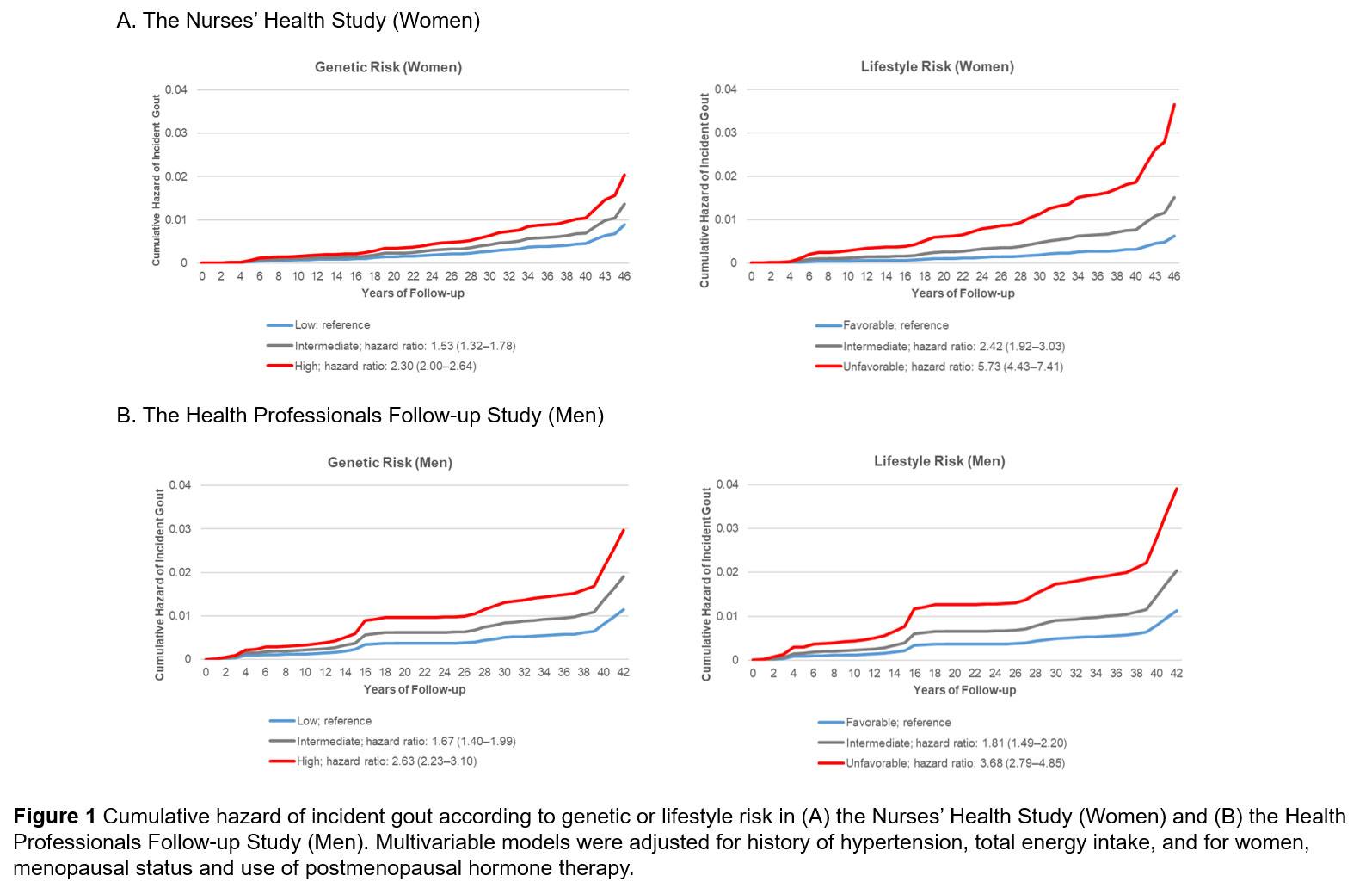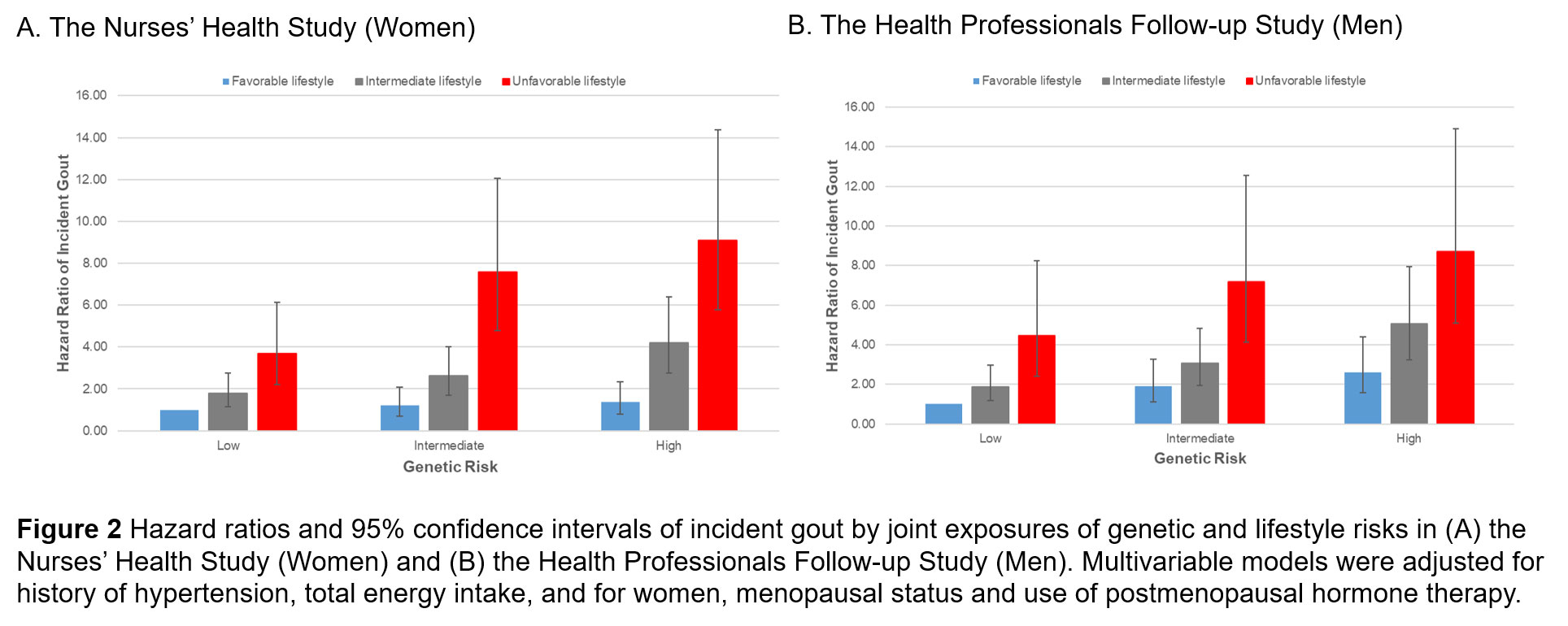Session Information
Date: Monday, November 14, 2022
Title: Abstracts: Epidemiology and Public Health I: Risk Factors and Outcomes
Session Type: Abstract Session
Session Time: 9:00AM-10:30AM
Background/Purpose: Lifestyle and genetic factors have been independently related to incident gout risk. However, it remains unknown whether the genetic risk of gout is affected by adherence to an overall healthy lifestyle. We aimed to prospectively investigate to what extent a healthy lifestyle can counteract genetic predisposition to gout.
Methods: We analyzed data from 18,244 women from the Nurses’ Health Study (NHS) and 10,175 men from the Health Professionals Follow-up Study (HPFS). Genetic risk of gout was quantified based on 114 urate-associated SNPs (Tin et al., 2019) and categorized as low (lowest tertile), intermediate (middle), and high (highest tertile). Lifestyle data were collected by validated food frequency and other questionnaires, and updated every 2-4 years. Healthy lifestyle factors included high adherence to the Dietary Approaches to Stop Hypertension (DASH) (DASH score in the highest quintile), no diuretic use, regular physical activity (≥ 10 MET-hours per week), normal body mass index (≤ 25 kg/m2), no smoking, and no/moderate alcohol consumption (≤ 15 g per day). Adherence to a healthy lifestyle was categorized into three levels according to the number of healthy lifestyle factors: unfavorable (0 or 1), intermediate (2, 3, or 4), and favorable (5 or 6). Relative excess risk due to interaction (RERI) was used as the index of additive interaction.
Results: We documented 1,360 cases of incident gout in the NHS (women) and 1,044 cases in the HPFS (men). Compared with low genetic risk, multivariable-adjusted hazard ratios (HRs) and 95% confidence intervals (CIs) of incident gout were 1.53 (1.32 to 1.78) for intermediate and 2.30 (2.00 to 2.64) for high genetic risk in women, and 1.67 (1.40 to 1.99) for intermediate and 2.63 (2.23 to 3.10) for high genetic risk in men. Compared with favorable lifestyle, HRs and 95% CIs of incident gout were 2.42 (1.92 to 3.03) for an intermediate and 5.73 (4.43 to 7.41) for an unfavorable lifestyle in women, and 1.81 (1.49 to 2.20) for an intermediate and 3.68 (2.79 to 4.85) for an unfavorable lifestyle in men (Figure 1).
Those at high genetic risk with an unfavorable lifestyle had approximately 9 times higher risk of incident gout than those in the lowest-risk category (i.e., low genetic risk with a favorable lifestyle) (HR 9.10 [5.77 to 14.37] in women and 8.71 [5.09 to 14.91] in men). However, among those at high genetic risk but adherent to a favorable lifestyle, the risk was 7-fold lower in women (HR 1.36 [0.79 to 2.34]) and 3-fold lower in men (HR 2.62 [1.57 to 4.39]) (Figure 2 and Table 1). There was significant additive interaction in women (RERI = 5.06 [95% CI, 2.32 to 7.79], P for additive interaction < 0.001) (Table 1).
Conclusion: In two large population-based cohorts of US women and men, genetic predisposition and an unhealthy lifestyle were individually and synergistically associated with a higher risk of incident gout. Among participants at intermediate and high genetic risk, a favorable lifestyle may counteract the majority of gout risk conferred by genetics, similar to coronary disease (Khera et al., NEJM, 2016) or type 2 diabetes (Ding et al., 2020). Our findings highlight the importance of adherence to a healthy lifestyle for gout prevention as well, especially in people genetically predisposed.
To cite this abstract in AMA style:
Lin K, McCormick N, Lu L, johi a, Yokose C, Choi H. Genetic Risk, Adherence to a Healthy Lifestyle, and Incident Gout in US Women and Men [abstract]. Arthritis Rheumatol. 2022; 74 (suppl 9). https://acrabstracts.org/abstract/genetic-risk-adherence-to-a-healthy-lifestyle-and-incident-gout-in-us-women-and-men/. Accessed .« Back to ACR Convergence 2022
ACR Meeting Abstracts - https://acrabstracts.org/abstract/genetic-risk-adherence-to-a-healthy-lifestyle-and-incident-gout-in-us-women-and-men/



